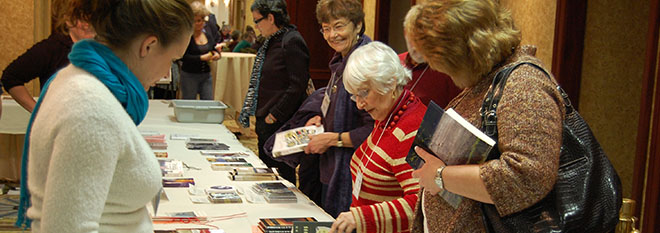Murphy Writing of Stockton University Presents

This entry is part of Getaway Reads, an e-mail series curated by Kendal Nicole Lambert that features the writing of the Winter Poetry & Prose Getaway faculty.
Beautiful Girls
by Anndee Hochman
The problem was an infected earlobe.
Sasha, my 13-year-old daughter, had been diligent about swabbing the new piercing twice a day, but the air is full of germs, and somehow one of them had crept inside. Now the ear throbbed scarlet, and a lymph node had swollen just behind it, an unforgiving pea beneath the satiny skin of her neck.

The doctor was not Sasha’s regular pediatrician, but a warm and competent partner in the cozy suburban practice. She wiggled the earring from its hotbed of infection, while my stoic daughter held back tears and my partner winced in empathetic pain. Then Dr. B. prescribed an oral antibiotic and a prescription cream.
The visit was over, nothing left to do but grab coats and write a check for the co-pay, when the doc called out, “She’s beautiful…does her daddy lock her in the closet on weekends?”
Suddenly, we had a new problem, far more inflamed and resistant than the pinkly painful earlobe. There is no daddy in our family. Closets aplenty, but we’d spent years breaking out of those, thank you very much. The only things closeted in our house were winter coats and warped umbrellas.
You could write off the incident as a moment’s thoughtlessness, one of those times when the ancestral brain overrides all rational filters. Except the comment was no fluke. Just a few days earlier, my cousin had said, nodding in Sasha’s direction: “She’s gorgeous. You guys better get a shotgun.”
And the day before that, in the moments immediately following Sasha’s bat mitzvah, during which she had chanted words of Torah and spoken eloquently of “everyday miracles,” my mother’s boss offered similar caution. “She’s a beauty. Better lock that one in the closet.”
How do I even begin to unpack these remarks, let alone respond to them? What I said to my mother’s boss was, “We don’t believe in locking kids in closets. We believe in teaching them to manage the world.” Humorless. Preachy. What my best friends later called “a classic 1980s feminist response.”
So, okay, how about humor? I wish I’d told my cousin, the one who recommended we arm ourselves to preserve our daughter’s innocence, “Yeah, we’ll put that shotgun on the shopping list, along with a chastity belt and a windowless tower.” And oh, for the presence of mind to lob the good doctor a snappy rejoinder: “Lock her up on weekends? Gosh…don’t you think that would be…child abuse?”
Here’s the truth: My daughter is indeed beautiful. And smart. And tough. And it enrages me when acquaintances, colleagues and strangers in the food co-op see only one aspect of her gorgeous complexity, then feel entitled to say something Medieval about it.
On Sasha’s birth announcement, we quoted Shakespeare’s A Midsummer Night’s Dream: “Though she be but little, she is fierce.” And fierce she was, even at one hour old and less than six pounds, when she did a one-armed push-up in her hospital isolette. At three weeks, she flipped herself from tummy to back with a torque of her tiny legs and an exertion of sheer will.
Fast-forward 13 years. Late on the night of her bat mitzvah, I found Sasha doing push-ups, barefoot in her silver party dress, on the carpet outside the synagogue’s social hall. Some nights, between face-washing and tooth-brushing, she hangs upside-down on the pull-up bar that is bolted into the bedroom doorway, her fleece pajama shirt bunched to reveal abs hard as cedar.
My daughter loves a good gel manicure and likes to fringe her ice-blue eyes with dark mascara. She also likes to argue, arm-wrestle and run a mile in less than eight minutes. When my partner, Elissa, explained what the doctor meant by her unfortunate remark, Sasha declared, “No one’s going to touch me unless I want them to!”
So when people suggest we keep Sasha under lock and key, they’re grossly underestimating her strength, ingenuity and pluck. But that’s not all they’re saying. Embedded in those remarks are centuries of poisonous myth: Beauty is dangerous. Women are helpless. Men are wolves. Parents (fathers, especially) must guard their daughters’ sexuality by any means necessary. And of course, there’s the assumption that she’s straight.
It would be laughable, except that it’s a short walk from those deep-seated beliefs to cultures where daughters are forbidden to read and wives are forbidden to drive, where girls suffer painful genital mutilation because their sexual pleasure is so suspect and their virginity so prized.
But my daughter isn’t being raised in Afghanistan or Somalia. She’s growing up in a progressive pocket of Philadelphia in 2014, a century and place teeming with strong, funny, competent women and men who call themselves feminists. Why, then, these retro words from the mouths of people—including a female pediatrician, for heaven’s sake—who certainly should know better?
Old stories take a long time to wither and die. The image of beauty bespoiled is a potent one. In a culture that sometimes feels as though it’s spinning out of control—Sexting! Online pedophiles! Thongs marketed to pre-teens!—maybe the sequestered adolescent or the shotgun-wielding papa is an appealing trope.
But not where I live. So, no, we will not be installing a padlock on Sasha’s bedroom door. No rifle on my shoulder as she strides down the front walk to meet her sweetheart.
Yes, the world of social and sexual interaction is rife with risk (chlamydia, pregnancy, almost-guaranteed heartbreak), but it’s not my job, as a parent, to police Sasha’s journey. It’s my job to help her learn tools to navigate on her own: Audacity. Self-regard. Candor. Communication. It’s my obligation to share every story I know about girls and women—stories from mythology and Torah and history, stories to critique and stories to admire. True ones, too, from Elissa’s life and mine, about times we said yes and times we said no and with whom and what happened next and how it all felt.
And this: When I was a teenager, my mother passed along the words of her grandmother, Ethel, a woman always described in family anecdotes as “a feminist before her time.” Ethel ran the business side of the bakery she and her husband owned in Philadelphia; she took a train to Chicago alone to visit relatives. And she advised her granddaughters, in salty Yiddish, that if a guy got fresh, they should “varfn im inem yam un pishn arayn zayn oyer.” Throw him in the ocean and pee in his ear.
Now, there’s an idea.
© Anndee Hochman. Published in Brain, Child Magazine, 2014.
+ + + + + + + + + +
The Winter Poetry & Prose Getaway and Murphy Writing are programs of Stockton University.
+ + + + + + + + + +
Anndee Hochman writes feature articles, profiles and essays about education, health and the wide, quirky spectrum of family and community life, including issues of adoption, foster care, reproductive technology, same-sex couples and intentional community. In addition to her regular pieces in the Philadelphia Inquirer, her work has appeared in O, the Oprah Magazine, Health, Working Mother, Marie Claire and online in Literary Mama. She is the author of Anatomies: A Novella and Stories (Picador 2000) and Everyday Acts & Small Subversions: Women Reinventing Family, Community and Home (The Eighth Mountain Press, 1994). For the past 20 years, Anndee has taught writing to children, teens and adults in a variety of settings, including schools, senior centers and a small fishing village on Mexico’s Pacific coast. Her website is anndeehochman.com.
+ + + + + + + + + +
Want to study with Anndee Hochman? Anndee will be leading The Heart and Craft of Memoir Workshop at the 2016 Winter Poetry & Prose Getaway.
+ + + + + + + + + +
Our Participants Say It Best
“The weekend was truly transformative for me. I was welcomed into circles of conversation with such uniquely diverse writers–an environment that allowed me to stretch and explore new ideas and ask questions. The prompts were superb and allowed me to dive right in. Thank you!”
~ Queenie, Ventnor, NJ
Our Philosophy
Escape the distractions of your busy life. Advance your craft and energize your writing with a challenging and supportive Writing Getaway. Join us at one of our upcoming writing retreats and take advantage of plentiful writing time, insightful feedback, good meals and good company. Get Away to Write.
+ + + + + + + + + +






